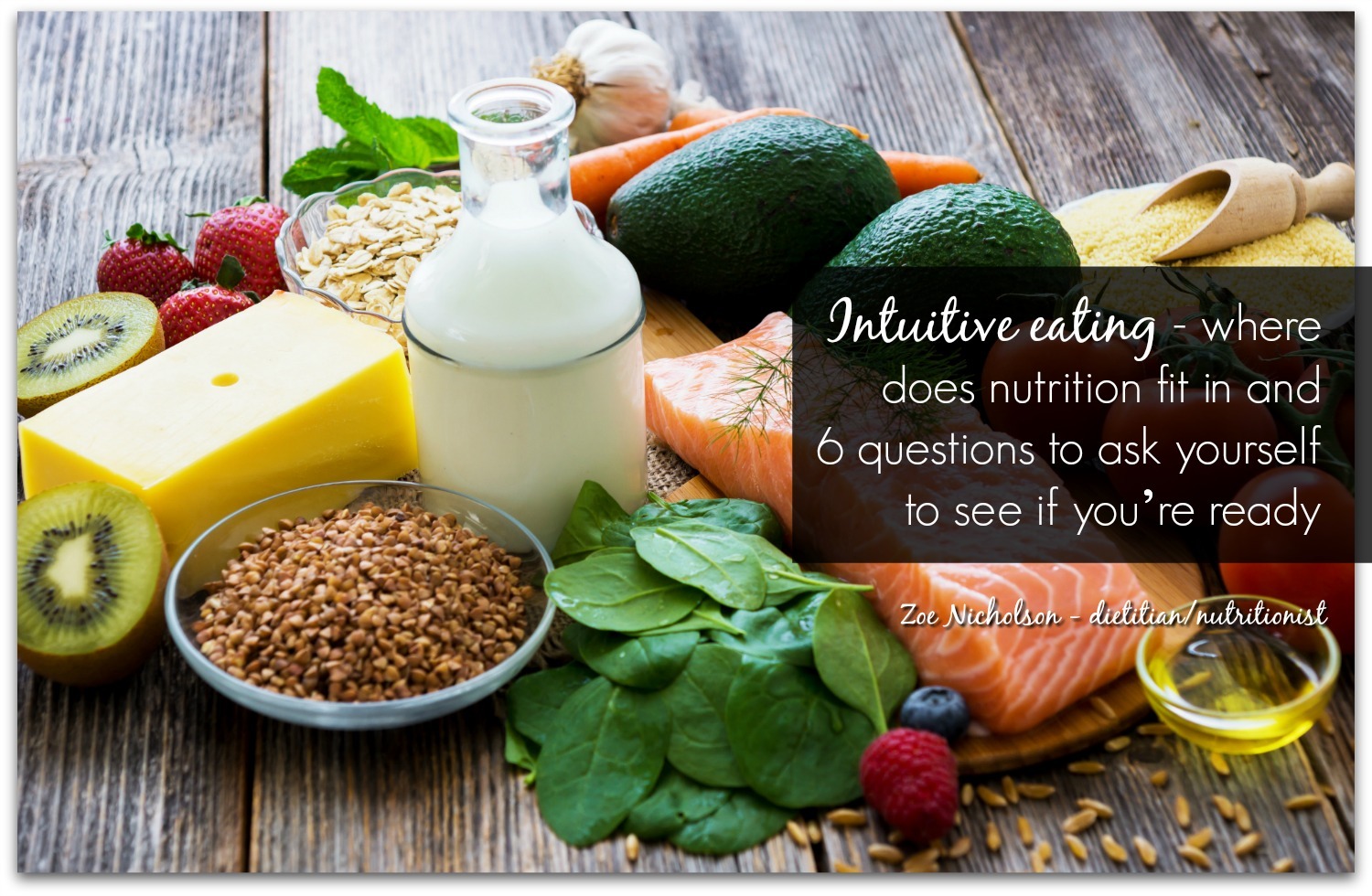Intuitive eating – where does nutrition fit in and 6 questions to ask yourself to see if you’re ready

One misconception with intuitive eating is that the idea is to eat whatever you want without a thought for nutrition or health. That said, you will most likely find that when you start the process, allowing yourself to eat freely without worrying about nutrition is actually a key step in healing your relationship with food. This includes the ability to rewire your brain and change your thinking around food to soften (and eventually rid) any anxiety, emotional distress or shame you have with food.
Once you’ve reached a point* where you feel much calmer around food, the food battle in your head has ceased and you think about food and/or nutrition a hell of a lot less, you may be ready to start paying more attention to nutrition. A key point here though, is how much attention do you actually need to pay to your nutrition? If you have a medical or health condition that is affected by food choices, then yes you may benefit from some gentle focus on nutrition. If you’re free a specific medical or health condition and generally you feel well and energised with your current pattern of eating, perhaps more focus is unnecessary. Either way, a non-diet dietitian can guide you with how much focus you may or may not need.
While nutrition is important to all humans, it has been massively overplayed. We are inundated with nutrition knowledge, self help books, recipe books, online recipes, the internet in general, ready to eat meals, food packaging, menu boards, social media, TV, gyms, a variety of health professionals, health coaches, fitness trainers and more – but where has all this knowledge taken us?
anti diet dietitian
If we consider that calories as we know them today didn’t come into common thinking until the 20th century, nor did we know what a vitamin was until last century and macronutrients were only discovered in the 1800s, how did humans manage prior to this? That is to say, humans have managed to feed themselves well enough for 1000s of years without this nutrition knowledge.
Rather than helping the majority of people have a better understanding of how to nourish themselves well, it would appear that we humans are more confused than ever! Rates of disordered eating and eating disorders are on the rise globally, especially in Asian countries. An over-focus on nutrition, especially tracking calories and/or macronutrients is commonly part of what leads people into disordered eating or an eating disorder.
Even if tracking calories and macronutrients doesn’t mess with a person’s psychology around food or result in mental health issues, it takes us away from listening our own internal cues of hunger, fullness and satisfaction, it takes us away from trusting our own bodies with what, when or how much to eat, something humans would have done naturally before we were introduced to the science of nutrition. A key part of the intuitive eating process is to redirect our thinking away from external cues (largely driven by nutrition science) on how to eat and instead reconnect to our bodies natural wisdom with eating.
Of course there are some circumstances where it may be useful to focus more on nutrition and even to monitor or track calories and/or macros. Some athletes, some pregnancies and some medical conditions may benefit from the nutrition knowledge we know have, but this isn’t always necessary. If you happen to have a medical or health condition that could benefit from modern nutrition knowledge, then by no means am I against using this knowledge, but we need to really careful with how we balance this against a person’s life circumstances and current relationship with food and body.
If you’ve had a complicated relationship with food but are on the mend, or fully healed and you’d like to focus on an aspect of nutrition, ask yourself these 6 question to see if you’re ready…
If for whatever reason it does’t happen, you’re completely ok with that and you don’t get mad at yourself
You enjoy eating that way, perhaps finding it even more pleasurable
The dietary change doesn’t increase how much you think about food when you don’t need to be
If you’re out of usual routine, ie on holidays and it’s not practical or is more difficult to follow the dietary change, it doesn’t phase you at all and you’re happy to go with the flow and wait until you’re back in usual routine
There is no guilt, shame or mental distress attached to whether or not you do what you intended
You don’t feel compelled to tell others what you’re doing, or advise that they would benefit from doing it too
Gentle nutrition is one the 10 principles of the intuitive eating process developed by dietitians Evelyn Tribole and Elyse Resch. You can read about the 10 principles here
* This can take anywhere from a few months to a few years
